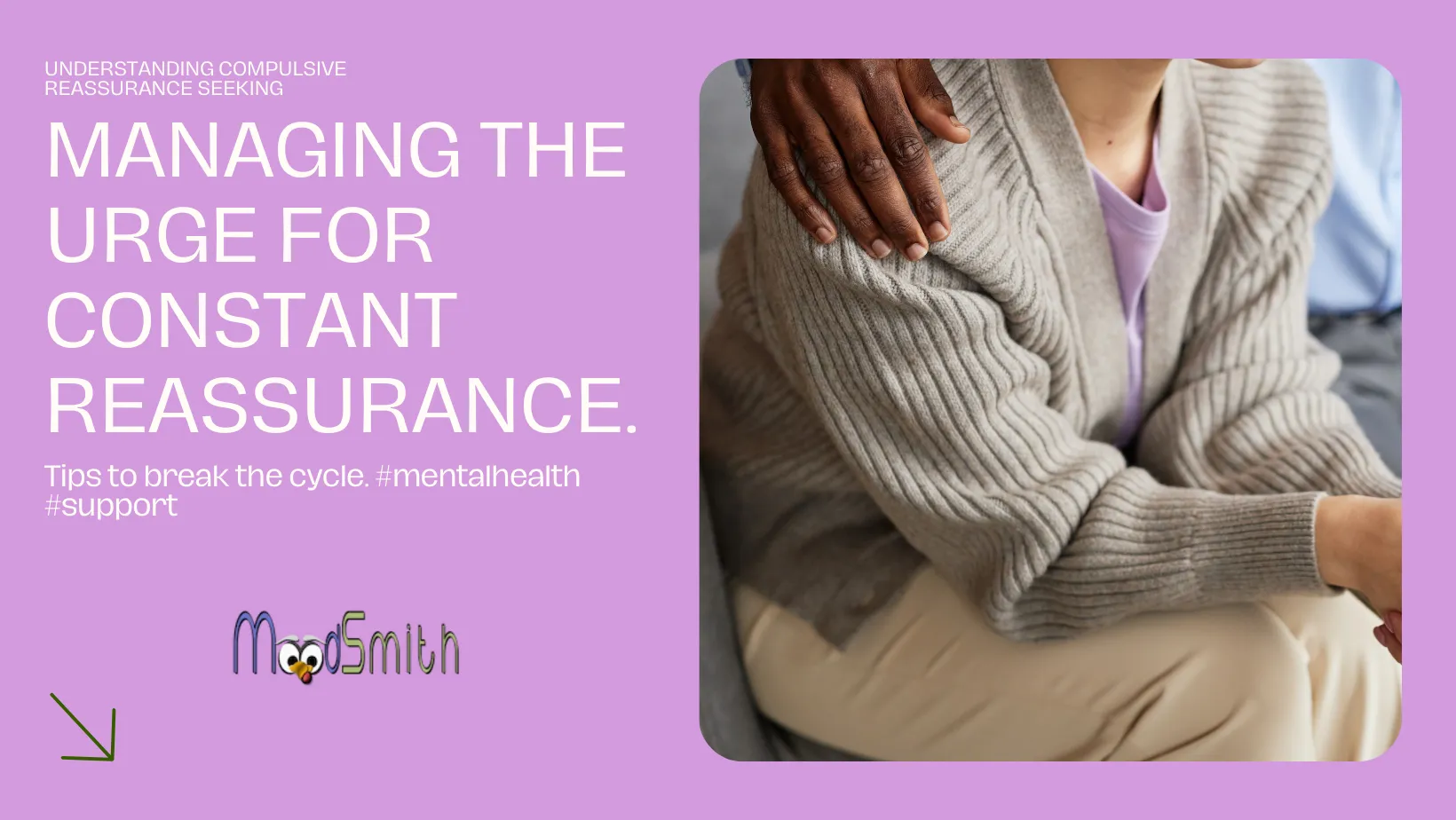Compulsive reassurance-seeking is a behaviour that many grapple with, often unknowingly. It is associated with anxiety disorders, mostly obsessive-compulsive disorder (OCD) and involves repeatedly asking others for reassurance to reduce their fears, uncertainty or anxiety.
It is not just a simple need for reassurance to feel a bit better or to get a second opinion on your thoughts. It’s a compulsive act, and in the case of OCD, can create a real vicious cycle and leave you firmly stuck in the cycle of OCD.
The compulsive behaviour can take different forms
- asking someone else for reassurance
- googling to get reassurance
- looking for some validation on social media
Regardless of how you seek reassurance, they all share the same characteristics, which are
- Repetition: Individuals seek reassurance frequently and repeatedly, often about the same issues.
- Dependence on Others: They rely heavily on others (family, friends, partners, professionals) to provide reassurance.
- Temporary Relief: The reassurance provides only short-term relief, leading to a cycle of anxiety and reassurance seeking.
- Impact on Relationships: This behaviour can strain relationships, as the person seeking reassurance may appear needy or distrustful.
Stop Intrusive Thoughts

Online course to help manage intrusive thoughts
Why do you do it?
There are many different triggers and causes behind this need for reassurance and I shall give a brief overview of some now.
- You might be excessively worried about your health and keep asking for reassurance from friends, doctors, or the internet out of fear that you have some terrible condition.
- You could be concerned about the safety of people you care about. Many years ago, while working with a client, this meant that she always needed her husband to text to say he had arrived; be that to work, get on the train, at his parents, or basically anytime he left the house, she needed reassurance that he was safe, and this constant need was creating a strain on their relationship.
- Respite from anxiety. Getting reassurance can give a temporary sense of relief from the anxiety you experience when you are worried or fearful and do not yet have the toolset to self-soothe and calm your own emotions.
The cause of needing such a high level of reassurance generally stems from anxiety disorders, health anxiety and OCD and the consequences of not being able to reassure yourself can be high.
Consequences
Compulsive reassurance-seeking can have significant implications from personal relationships as in the example of my client above to mental health and it is important that you are able to stop as from a professional perspective (I am a psychologist who works with people with OCD), it is not just reassurance seeking, it is a compulsive behaviour that is detrimental to your mental well-being and in the long term it is much better for you if you can self soothe.

How to stop
Firstly you need to recognise that it is a compulsive behaviour. You can check this by asking yourself, do you feel compelled to do it? Would you feel much more anxious if you were not able to seek reassurance, would it make things worse for you? Do you get a sense of relief once you do it, does your anxiety go down, but only for a short time?
If you answer yes, it could be a compulsive behaviour that is not helping long term and one you need to stop, and Cognitive Behavioural Therapy (CBT) is a good place to start.
Cognitive-Behavioural Therapy (CBT) is a proven method for treating compulsive reassurance seeking. It helps individuals understand their thought patterns and develop healthier responses. Exposure Response Prevention (ERP), a component of CBT, involves gradually facing fears without seeking reassurance, thereby breaking the cycle of anxiety and reassurance seeking.
Another crucial strategy is developing distress tolerance. This involves learning to tolerate uncomfortable feelings without resorting to reassurance seeking. Techniques such as mindfulness, deep breathing, and progressive muscle relaxation can help manage anxiety and reduce the need for constant reassurance.
When to meet with a mental health professions
If your behaviours are taking up time during your day and they are not something that you feel you can manage on your own, meeting with a professional who has expertise in OCD is a really good idea. If you are not sure where to start, a quick conversation with your local doctor should point you in the right direction of how is available in your area.
